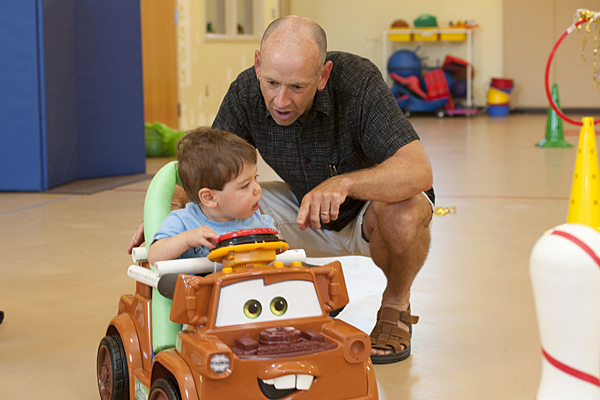People seem to talk all the time about
how much learning happens within a very small window of time during
childhood. Children's curiosity and ability to explore their
surroundings is extremely important in making cognitive process and
developing social skills. But what, then, happens to those children
who have mobile limitations and are unable to crawl or walk around
the unfamiliar parts of their environments?
Dr. Cole Galloway, professor of
physical therapy and University of Delaware, was been working to get
around this predicament. Galloway saw that motorized chairs that
would give some independence to users aren't usually available to
kids until they are older, so he decided to develop his own chairs in
a project called GoBabyGo. He quickly found that his high-tech
robotics were too expensive and could not easily be produced in a
volume that met demand, but eventually decided to try fixing up a
product that was already on the market: battery powered toy cars.
 |
| Galloway and his tiny client in a converted Tow Mater toy. |
Galloway took the Barbie Jeeps and
Lightning McQueens and gave them a little race car tune up. The
augmented toys have padded safety cages, seat belt harnesses, and
custom driver controls to suit the users' needs. His cars are tested
by his clients on both and indoor and outdoor tracks, and he even has
traveling seminars to teach families how to convert their own
motorized toys to make them more accessible.
It doesn't end here with Galloway. The
success of GoBabyGo prompted him to design the prototype for UDare2B,
aka Big Blue, a toy car with a specific purpose and a lot of tech.
Big Blue's egg shape makes it look sleek, fierce, and futuristic, but
it also acts as a support and a protective roll cage of sorts. It has
an adaptive steering system that lets the controls be adjusted to the
physical abilities of the driver. Additionally, the tight turning
radius, compact size, and light weight make it highly maneuverable
and suitable for indoor and outdoor use. Computerized monitoring in
the cars log data to help researchers learn how they are being used
by children.
 |
| UDare2Be / Big Blue |
It seems like a pretty big undertaking,
but the project could produce a working model of Big Blue in about a
year if all goes well, and there is already commercial interest from
adult mobility scooter companies. This would mean having clinically
effective and real-world ready vehicles for young children, which is
awesome.
What do you think of the design? How
about Dr. Galloway's endeavor as a whole? Share your thoughts!



It looks really cool. Which should be nice for kids who are often stuck with "serviceable" or downright dorky equipment.
ReplyDeleteYes! These kids will be the talk of the town...for the RIGHT reasons!
Delete